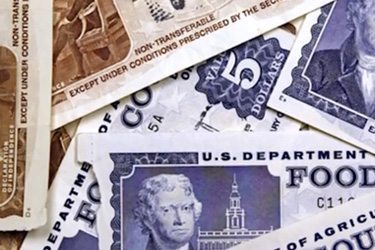With Farm Bill Close to Expiring, Rhetoric Against Food Stamps Continues
While conservatives lead in this rhetoric, the willingness to cut food stamps is found among moderate Democrats as well—revealing that this longstanding program for the poor may be very vulnerable.

The current Farm Bill is set to expire this month, but lawmakers are still at an impasse about how to proceed with a new version of the law, which historically has set agricultural and food aid policy. A major point of contention holding it up is the Supplemental Nutrition Assistance Program (SNAP), also known as food stamps, which has been part of the Farm Bill for over fifty years. Some 47 million Americans rely on food stamps, many of whom are children.
Conservatives have made no secret of the fact that they seek to sharply reduce or eliminate SNAP from the Farm Bill, and to this end, have displayed forceful rhetoric against food stamps. During the week of the 50th anniversary of the March on Washington, for example, Sen. Rand Paul (R-KY) described food stamps as “servitude.” He said, “As humans, yeah, we do have an obligation to give people water, to give people food, to give people health care … but it’s not a right because once you conscript people and say, ‘Oh, it’s a right,’ then really you’re in charge, it’s servitude, you’re in charge of me and I’m supposed to do whatever you tell me to do.”
The remarks hearken back to 2011 comments he made in which he directly compared health care to slavery.
In his words, Paul displays no understanding of why food aid is so critical for so many Americans, particularly given the failure of the current economy to enable every person to be completely self sufficient. To qualify for food stamps, a three-person family’s gross monthly income generally must be at or below 130 percent of the poverty line, or $2,069 (about $24,800 a year). While people of many backgrounds rely on food stamps, African Americans do so disproportionately: 22 percent of all food stamp recipients are Black, but only 13 percent of the overall U.S. population is Black, as the Washington Post noted in July.
Thus to claim that food aid for poor people is akin to humans keeping other humans in bondage is a careless denial of both the reality of slavery as well as the struggle many people of color experience in the current economy.
And while conservatives lead in this rhetoric, the willingness to cut food stamps is found among moderate Democrats as well—revealing that this longstanding program for the poor may be very vulnerable. Take, for example, the story of Cynthia Gilkeson, a woman of color living in Newburgh, New York, with her two teenage children. Now 49, Gilkeson began working construction at the age of 17 but has had to switch her line of work due to a knee injury. She relies on food stamps for her children.
“Me and my kids wouldn’t be able to survive without food stamps,” Gilkeson said. “I would have to work three jobs.” She often buys bulk food from Wal-Mart so she can stretch the food stamp dollars further for her children—even though she disagrees with Wal-Mart’s political stances. She is currently studying pre-law in hopes of earning a degree that would build her earning potential. Her two teenagers are college bound, and she has a 19-year-old son who is currently in college.
Gilkeson is also a member leader of an organization called Community Voices Heard (CVH), a New York group that is comprised of women of color, many of whom rely on public benefits like food stamps. CVH has a sister group that is authorized to lobby but does not typically back candidates.
But recently, the group campaigned hard for Rep. Sean Patrick Maloney (D-NY), because he was believed to be a stronger advocate for public benefits. Yet to CVH’s dismay, Rep. Maloney, a member of the House Agriculture Committee, chose to vote with Republicans in favor of a $20 billion cut to food stamps earlier this year. Seemingly, outrage from his constituents led Rep. Maloney to ultimately vote against the steep cut when it came to a floor vote—though 24 Democrats actually voted for it.
Gilkeson and other CVH member-activists have been deeply disappointed in Maloney’s committee vote and do not feel confident in his advocacy for people who are facing tough times. “In how they’re dealing with food stamps, [politicians] just don’t take people like me into consideration,” Gilkeson said.
Her story is part of a larger narrative: employment is disproportionately low for people of color in the United States. Economist Joseph Stiglitz recently wrote in the New York Times, “The raw numbers tell much of the story: There has been no significant closing of the gap between the income of African-Americans (or Hispanics) and white Americans the last 30 years. In 2011, the median income of [B]lack families was $40,495, just 58 percent of the median income of white families.”
Yet both the rhetoric against food stamps and the willingness to cut the program reveal a lack of understanding of the role they play in helping families like Gilkeson’s stay afloat.
“It’s hard to live this way,” she says. “There are times when my kids are hungry but I can’t buy more food until the food stamp check arrives.”
